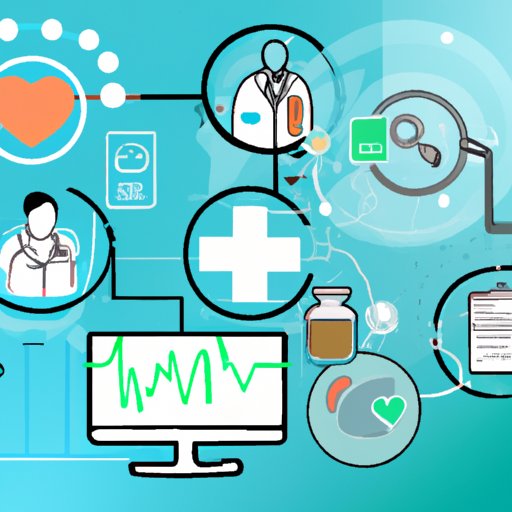Introduction
In today’s increasingly digital world, health informatics has become an integral part of healthcare. It is a field that combines information science, computer science, and healthcare to improve the delivery of care and increase the efficiency of healthcare systems. But what is health informatics, and how does it benefit healthcare? In this article, we will explore the role of health informatics in healthcare and examine the potential benefits it can offer.
Understanding the Basics
Health informatics is the intersection of computing and information technology with the field of healthcare. It is a broad term that encompasses a wide range of activities, from managing electronic health records (EHRs) to developing algorithms to improve the accuracy of diagnoses.
The goal of health informatics is to enable better decision making in healthcare by providing access to timely and accurate data. This data can be used to identify trends in patient care, develop new treatments and therapies, and improve safety and outcomes. By leveraging technology, health informatics can help healthcare professionals make more informed decisions and provide better care for their patients.
Examining the Benefits of Health Informatics
Health informatics has the potential to provide a number of benefits to both healthcare providers and patients. Here are some of the potential benefits of health informatics:
Improving Patient Care
Health informatics can help healthcare providers make more informed decisions about patient care. By having access to up-to-date data, healthcare providers can better assess a patient’s condition and determine the best course of action. According to a study conducted by the American Medical Informatics Association, “electronic health record systems have been found to reduce medical errors, improve patient safety, and increase the quality of care.”
Enhancing Efficiency and Cost Savings
Health informatics also offers the potential to improve the efficiency of healthcare organizations by streamlining processes and eliminating manual tasks. For example, using automated processes to collect and analyze data can help reduce the time it takes to complete tasks and make it easier to track progress. Additionally, automating certain processes can reduce costs associated with staffing and other overhead expenses.
Supporting Interoperability
Interoperability is essential for healthcare organizations to share data and collaborate effectively. Health informatics can facilitate interoperability by providing a platform for sharing data across different systems. This can help reduce the time it takes to access patient data and allow healthcare providers to quickly respond to changes in patient care.

Exploring the Impact of Health Informatics on Patient Care
Health informatics can have a direct impact on patient care by improving access to quality care, streamlining diagnoses and treatments, and developing evidence-based medicine. Here are some of the ways that health informatics can improve patient care:
Improving Access to Quality Care
Health informatics can help healthcare providers improve access to quality care by providing access to comprehensive patient data. By having access to all of a patient’s medical history, healthcare providers can make more informed decisions about treatment plans and ensure that patients receive the most appropriate care.
Streamlining Diagnoses and Treatments
Health informatics can also help healthcare providers streamline diagnoses and treatments. By having access to real-time data, healthcare providers can quickly identify potential issues and develop treatment plans that are tailored to each patient. This can help reduce the amount of time it takes to diagnose and treat conditions, leading to better outcomes for patients.
Developing Evidence-Based Medicine
Health informatics can also play a role in developing evidence-based medicine. By collecting and analyzing data, healthcare providers can identify patterns and trends in patient care, which can help them develop more effective treatments and protocols. Additionally, health informatics can help healthcare providers better understand the efficacy of different treatments and interventions, allowing them to make more informed decisions about patient care.

The Future of Health Informatics
Health informatics is becoming increasingly important in healthcare, and its role is likely to continue to grow in the years ahead. As technology advances, health informatics will become even more powerful, offering new opportunities for healthcare providers to improve patient care and reduce costs. Here are some of the ways that technology can be leveraged to improve health informatics:
What Does It Hold?
Artificial intelligence (AI) and machine learning are two technologies that could revolutionize health informatics. AI can be used to automate complex tasks and analyze large amounts of data, while machine learning can be used to identify patterns in data and develop predictive models. These technologies could be used to improve the accuracy of diagnoses, streamline administrative tasks, and reduce the cost of healthcare.
How Can We Leverage Technology?
The Internet of Things (IoT) is another technology that can be leveraged to improve health informatics. IoT devices can be used to collect data from patients and send it directly to healthcare providers, allowing them to monitor patient health in real-time. Additionally, IoT devices can be used to automate administrative tasks, such as scheduling appointments and ordering supplies.
Conclusion
Health informatics is an important field that has the potential to revolutionize healthcare. By leveraging technology, health informatics can improve patient care, enhance efficiency and cost savings, and support interoperability. As technology continues to advance, health informatics will become even more powerful, unlocking new opportunities for healthcare providers to deliver better care for their patients.
(Note: Is this article not meeting your expectations? Do you have knowledge or insights to share? Unlock new opportunities and expand your reach by joining our authors team. Click Registration to join us and share your expertise with our readers.)
